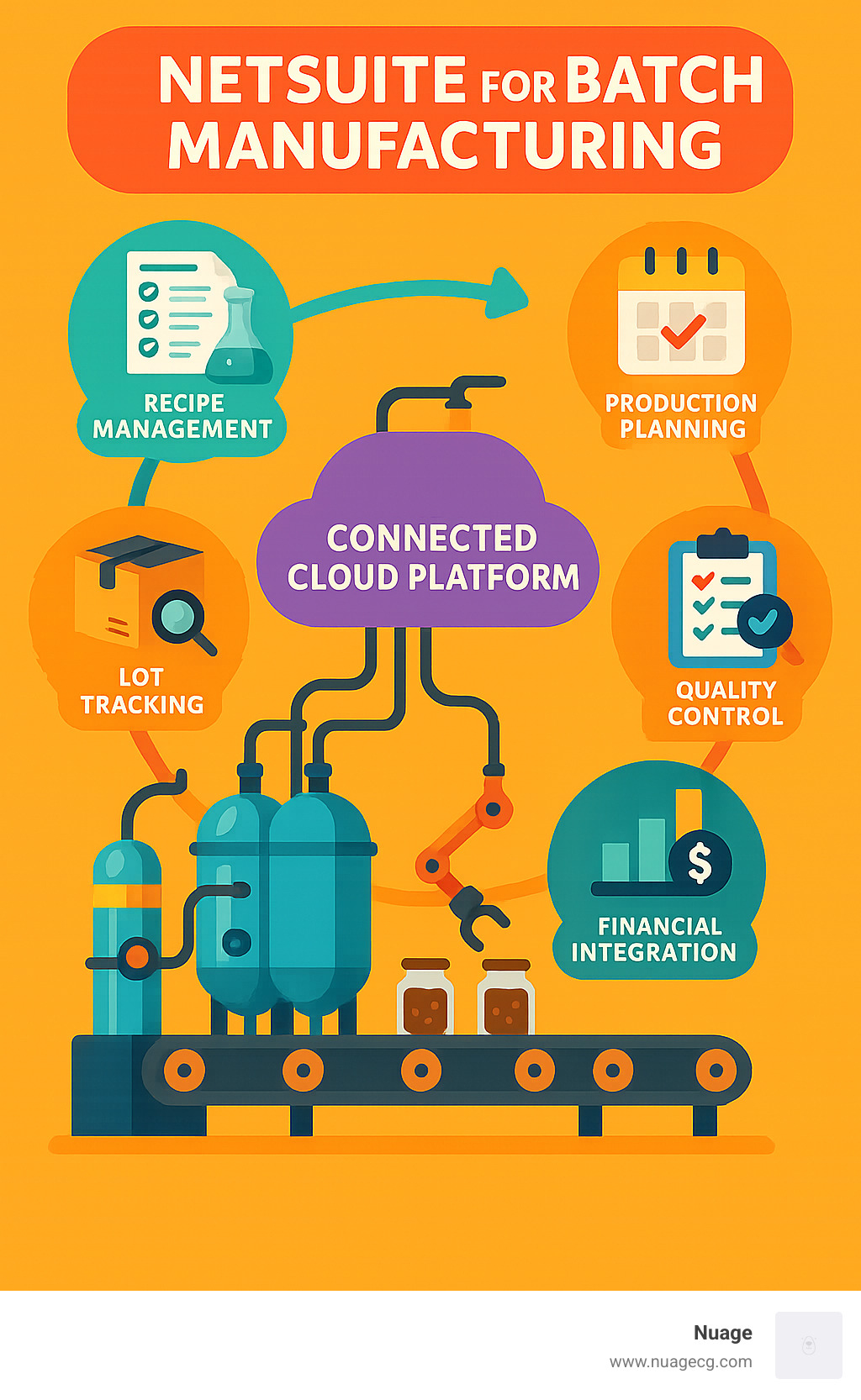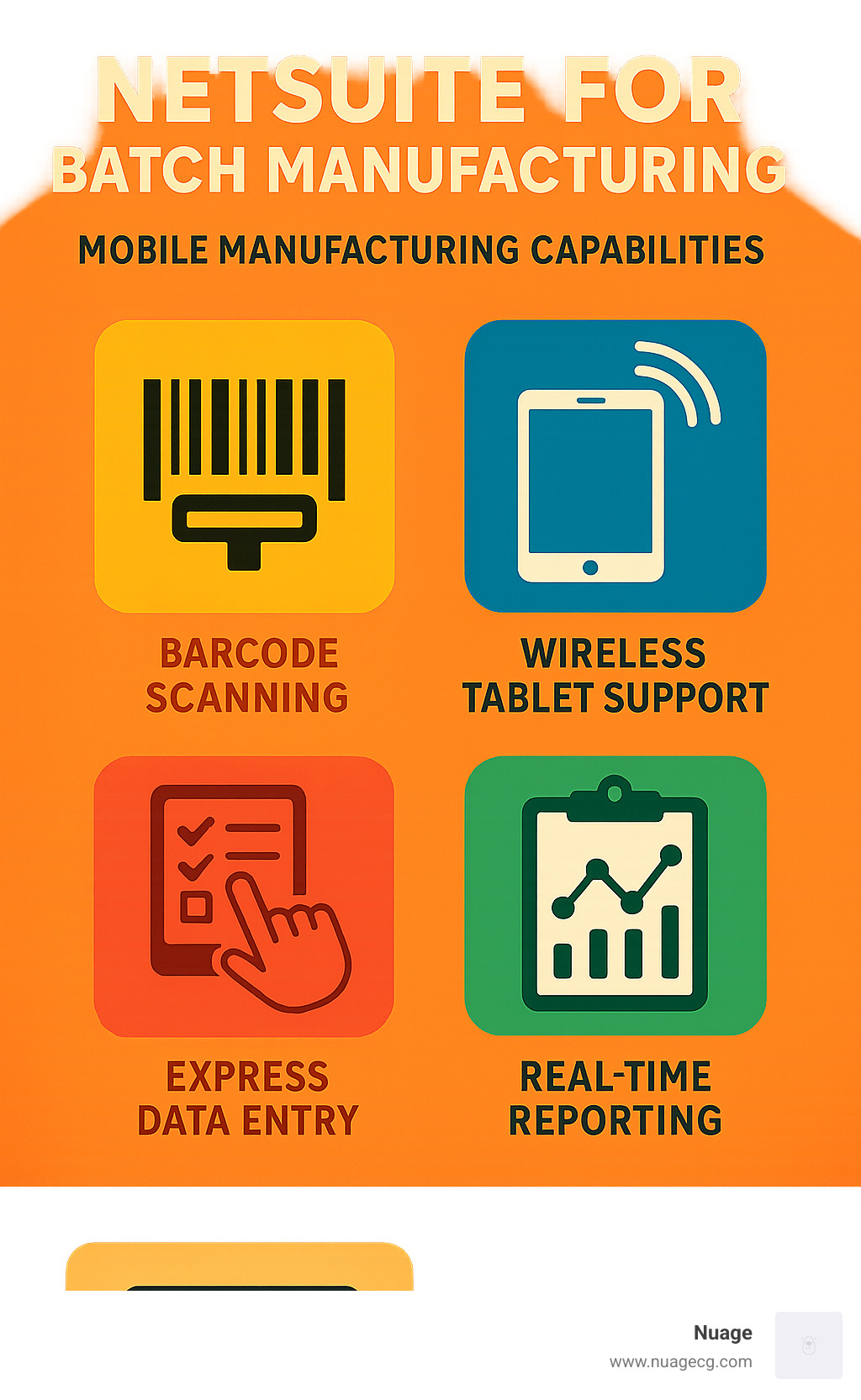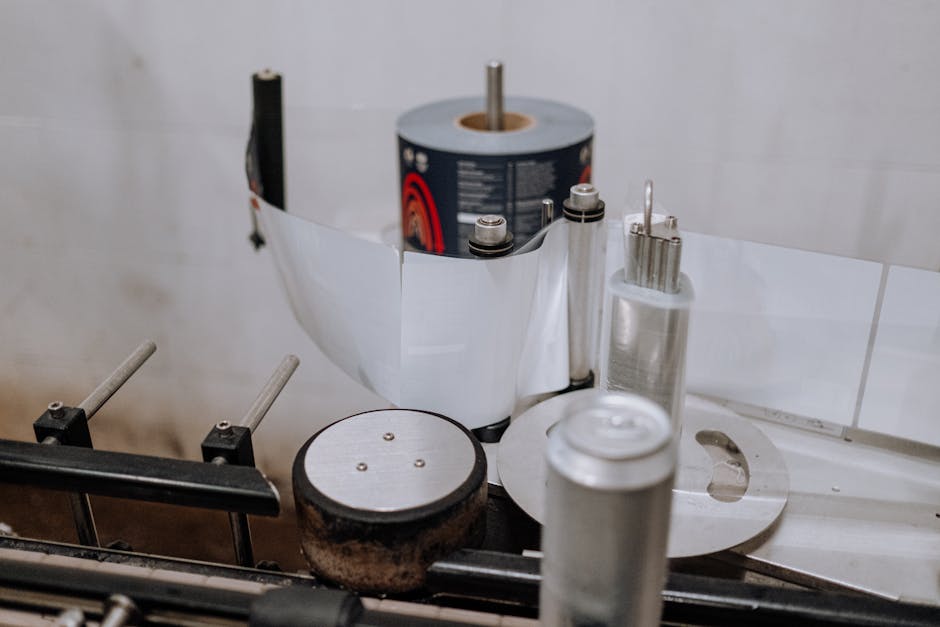Batch Manufacturing Success: What You Need to Know
NetSuite for Batch Manufacturing is a cloud-based ERP solution that provides complete visibility and control over batch production processes. If you’re exploring options for managing your batch manufacturing operations, here’s what you need to know:
| Key NetSuite Batch Manufacturing Features | Benefits |
|---|---|
| Recipe/Formulation Management | Standardize production with version control and ingredient substitutions |
| Batch Travelers with Lot Tracking | Ensure full traceability from raw materials to finished goods |
| FIFO Material Issuance | Maintain quality control and minimize waste |
| Mobile Shop Floor Data Capture | Real-time production visibility and quality checks |
| Finite Capacity Scheduling | Optimize production planning and resource utilization |
| Integrated Quality Management | Define inspection plans with pass/fail criteria |
Batch manufacturing comes with unique challenges that traditional ERP systems often struggle to address. From recipe management to lot traceability, quality control to compliance requirements, batch producers need specialized tools to maintain efficiency and consistency.
“Finding efficiencies and improving quality can make a huge difference to your bottom line.”
Unlike discrete manufacturing, batch production involves creating multiple identical products simultaneously through a series of process stages. This approach balances mass production efficiency with flexibility to meet changing market demands. However, it requires careful scheduling, precise inventory control, and robust quality management.
Traditional systems often force manufacturers to cobble together disconnected solutions, resulting in data silos and inefficient workflows.
NetSuite’s Advanced Manufacturing module delivers a single integrated cloud solution that replaces these disconnected systems, providing real-time visibility from the shop floor to the top floor.
I’m Louis Balla, CRO and partner at Nuage, with over 15 years of experience implementing NetSuite for Batch Manufacturing and digital change solutions for manufacturing businesses. My expertise comes from overseeing numerous NetSuite implementations and integrations specifically designed to address the unique challenges of batch production environments.

NetSuite for Batch Manufacturing terminology:
Batch Manufacturing 101: Concepts, Methods & Challenges
Think of batch manufacturing as baking cookies at home, but on an industrial scale. Instead of making one cookie at a time, you mix ingredients for an entire batch, bake them together, and package them as a group. This production method creates identical items in batches rather than continuously or individually, and it’s the backbone of industries like food and beverage, pharmaceuticals, chemicals, and cosmetics.
Batch manufacturing revolves around completing one production stage before moving to the next. Imagine a haircare company producing 500 bottles of shampoo in one batch, then reconfiguring their equipment to make 300 bottles of conditioner in the next run.
“Creating a well-designed production schedule that optimizes workflow, reduces waste and contains costs is key to a successful manufacturing process.”
At the heart of batch production is the batch definition – a specific quantity of product made in a single production run. Each batch follows a recipe or formulation that details ingredients, quantities, and processing instructions. Between different product runs, manufacturers perform setup and changeover procedures to reconfigure equipment.
Other key aspects include managing co-products (secondary items that result from production), maintaining lot traceability (tracking materials from input to output), implementing rigorous quality control, and ensuring compliance with regulations like FDA guidelines and Good Manufacturing Practices (GMP).
| Manufacturing Method | Production Style | Equipment Usage | Traceability Needs | Industries |
|---|---|---|---|---|
| Batch | Groups of identical items | Shared across products | High (lot-based) | Food, Pharma, Chemicals |
| Discrete | Individual units | Dedicated per product | Medium (serial-based) | Electronics, Machinery |
| Continuous | Uninterrupted flow | Fixed, specialized | Low to Medium | Oil, Paper, Steel |
Why Batch Manufacturing Differs From Other Methods
NetSuite for Batch Manufacturing excels in environments that operate differently from traditional production methods. Here’s why batch manufacturing stands apart:
Production stages in batch manufacturing are distinct and sequential. A specialty bakery mixes ingredients for multiple loaves in one batch, bakes them together, and then packages them as a group – rather than moving products continuously through an assembly line.
Shared equipment is another hallmark of batch production. A pharmaceutical facility might produce cold treatments in one batch run, then reconfigure the same equipment for allergy medications in the next. This flexibility allows manufacturers to create diverse products without investing in separate production lines.
The high-mix production environment is where batch manufacturing truly shines. As one of our customers noted, “We can mix-and-match formula demands from sales and work orders, adding or removing orders at any time to adapt production.” This adaptability is crucial for businesses with diverse product portfolios.
Many batch manufacturers operate in regulated industries with strict documentation requirements. For pharmaceuticals, food, and cosmetics, detailed records of each batch are mandatory – including ingredient traceability, quality test results, and production conditions.
Batch manufacturers face unique challenges that NetSuite for Batch Manufacturing is designed to address:
Managing frequent recipe changes and ingredient substitutions becomes simple with version control. Balancing production efficiency with flexibility is achievable through smart scheduling. Lot traceability throughout production ensures quality and compliance. Minimizing changeover time between batches improves efficiency. Ensuring consistent quality across different batches becomes possible with integrated quality management. Meeting regulatory requirements is streamlined with built-in compliance tools. And calculating accurate batch costs, including shared resources, is handled automatically.
For more insights on how ERP systems support batch manufacturing processes, check out our detailed guide on ERP for Process Manufacturing.
NetSuite for Batch Manufacturing: Features & Benefits
NetSuite for Batch Manufacturing provides a comprehensive suite of tools designed specifically to address the unique challenges of batch production environments. Let’s explore the key features that make NetSuite an ideal solution for batch manufacturers:
Recipe/Formulation Management
NetSuite’s recipe management capabilities allow batch manufacturers to:
- Define detailed formulations with precise ingredient quantities
- Manage multiple recipe versions with change control
- Substitute ingredients on-the-fly when shortages occur
- Scale recipes up or down while maintaining proportions
- Associate specific work instructions with each formulation
Lot Tracking and Batch Travelers
Full traceability is essential in batch manufacturing. NetSuite provides:
- Automatic lot ID generation for each batch
- Barcode-enabled batch travelers to track materials through production
- Ability to trace finished goods back to their source ingredients
- Limit recall scope by tracing inputs to specific batches and containers
- Track white-labeled vs. non-white-labeled products within the same batch
Batch Scheduling
NetSuite’s scheduling tools help optimize production flow:
- Group identical products into batches to minimize setup changes
- Balance supply and demand with real-time scheduling engines
- View production schedules in calendar or Gantt chart formats
- Drag-and-drop scheduling for quick adjustments
- Compare resource supply against demand for capacity planning
“A well-designed production schedule that optimizes workflow, reduces waste and contains costs is key to a successful manufacturing process.”
Advanced Manufacturing Module
NetSuite’s Advanced Manufacturing module extends batch capabilities with:
- Expanded Manufacturing Work Bench for detailed process control
- Alternate assets management for equipment flexibility
- Co-products tracking for secondary batch outputs
- Extended Setup Criteria via an Admin Console
- Work order release controls custom to batch environments
Mobile Manufacturing Execution System (MES)
Real-time shop floor data is critical for batch control:
- Barcode scanning for material issuance and receipt
- Wireless tablet functionality for harsh environments
- Express data entry for rapid production reporting
- Material issuance tracking in real-time
- Downtime and labor/machine hours reporting
FIFO Material Issuance
Quality control in batch manufacturing often requires:
- First-In-First-Out (FIFO) material issuance for lot-controlled items
- Automated tracking of material consumption
- Expiration date management for ingredients
- Visibility into inventory age and shelf-life
Quality Management
NetSuite’s quality features support batch requirements:
- Define inspection plans with pass/fail criteria
- Conduct in-process quality checks during batch production
- Generate non-conformance reports when issues arise
- Link quality results directly to specific batches
- Maintain quality records for compliance purposes

Compliance Toolkit
For regulated batch industries, NetSuite provides:
- Electronic signatures for batch record approvals
- Audit trails for all system changes
- Documentation generation for regulatory submissions
- Validation support for FDA-regulated environments
- Segregation of duties for proper controls
Real-Time Dashboards and KPIs
Visibility is improved through:
- Role-based dashboards showing relevant batch metrics
- Real-time production status monitoring
- Cost variance analysis by batch
- Quality metrics tracking
- Resource utilization reporting
Cost Roll-Ups
Accurate batch costing is enabled by:
- Detailed cost tracking for materials, labor, and overhead
- Actual vs. standard cost comparisons
- Yield and efficiency calculations
- Allocation of shared resource costs
- Cost roll-ups for multi-level recipes
You can learn more about these capabilities by watching NetSuite Advanced Manufacturing video or reading about ERP for Batch Manufacturing.
How NetSuite for Batch Manufacturing Outshines On-Premise ERP
When compared to traditional on-premise ERP systems, NetSuite for Batch Manufacturing offers several significant advantages:
Cloud Scalability
NetSuite’s cloud architecture allows batch manufacturers to:
- Add users and functionality as the business grows
- Access the system from anywhere, including remote production sites
- Scale computing resources during peak production periods
- Deploy new facilities quickly without additional infrastructure
- Support multi-site operations with a single database
SaaS TCO (Total Cost of Ownership)
The SaaS delivery model reduces costs by:
- Eliminating on-premise servers and license fees
- Reducing IT support requirements
- Providing automatic upgrades without disruption
- Including data redundancy and disaster recovery
- Offering subscription-based pricing aligned with business growth
“NetSuite’s SaaS model can reduce total cost of ownership by 50% or more compared to traditional on-premise solutions.”
Automatic Upgrades
Batch manufacturers benefit from:
- Twice-yearly automatic upgrades with new features
- No disruption to customizations during upgrades
- Continuous regulatory compliance updates
- Access to the latest batch manufacturing capabilities
- Reduced IT maintenance burden
Global Multi-Currency Support
For international batch operations, NetSuite provides:
- Support for operations in over 200 countries
- Management of 190 different currencies
- Availability in 27 languages
- Consolidated reporting across global facilities
- Compliance with international regulations
Learn more about these advantages in our guide to ERP Software for Batch Manufacturing.
Real-Time Visibility with NetSuite for Batch Manufacturing
One of the most powerful benefits of NetSuite for Batch Manufacturing is the real-time visibility it provides across all aspects of batch production:
SuiteAnalytics
NetSuite’s analytics platform offers:
- Self-service reporting on batch performance
- Drill-down capabilities from summary to detail
- Custom saved searches for batch-specific metrics
- Real-time dashboards with graphical indicators
- Role-based security for appropriate data access
Role-Based Dashboards
Different stakeholders see relevant information:
- Production managers view active batches and schedules
- Quality managers monitor inspection results and deviations
- Inventory managers track material consumption and availability
- Executives see cost and efficiency metrics across all batches
- Regulatory personnel access compliance documentation
Shop-Floor Data Capture
Real-time production data flows through:
- Barcode scanning of materials and batches
- Tablet-based work instructions and reporting
- Automated machine data collection where applicable
- Time and attendance tracking for labor costing
- Quality test results entered at the point of inspection
Mobile Barcode Capabilities
Mobile technology improves batch visibility with:
- Scanning batch travelers at each production stage
- Recording material consumption in real-time
- Capturing quality results immediately
- Tracking container and lot movements
- Validating correct materials for each batch
Variance Alerts
Proactive notifications help maintain control:
- Alerts for deviations from standard recipes
- Notifications of quality test failures
- Warnings about potential material shortages
- Indicators of schedule conflicts or delays
- Highlighting of cost variances by batch
As one manufacturer reported, “We’ve cut our financial close process from 20 days to three days and can create reports in minutes rather than weeks” after implementing NetSuite.
Implementing & Scaling NetSuite for Batch Manufacturers
Getting NetSuite for Batch Manufacturing up and running doesn’t have to be intimidating. At Nuage, we’ve refined our approach through years of helping batch manufacturers make the transition, and we’ve learned a thing or two along the way.
Implementation Roadmap
Think of your implementation journey as a recipe with six essential ingredients:
We start with Findy and Planning where we’ll sit down with your team to understand your unique batch processes. We’ll map out your current workflows, spot opportunities for improvement, and create a realistic timeline that works for your business. This is also where we develop a strategy for migrating your recipes, inventory data, and batch history.
Next comes System Configuration, where we build the foundation of your NetSuite for Batch Manufacturing environment. We’ll set up your company structure, configure batch-specific settings, and establish your recipes, routings, and quality parameters. This is also when we define how lot tracking and batch numbering will work in your system.
The Data Migration phase is where the magic happens converting your existing information into NetSuite’s format. We’ll help clean up your recipe data, import inventory with appropriate lot information, and transfer customer and vendor records. For regulated industries, we can also migrate historical batch records to maintain compliance.
During Testing and Validation, we’ll put your new system through its paces. We conduct thorough testing of batch processes, validate regulatory compliance requirements, and stress-test the system with realistic volume scenarios. This gives your team confidence that everything will work as expected when you go live.
Training and Change Management is often overlooked but absolutely crucial. We provide role-based training for everyone from shop floor operators to executive leadership. We’ll help develop standard operating procedures and prepare your team for the cultural shift that comes with digital change.
Finally, Go-Live and Support is where it all comes together. We execute a carefully planned cutover with minimal disruption and provide intensive support during your initial production batches. This is also when we begin identifying opportunities for continuous improvement.
Choosing the Right Module Tier
NetSuite for Batch Manufacturing offers flexibility through three module tiers:
Work Orders & Assemblies works well for simpler batch operations with straightforward bills of materials. It’s perfect if you’re just starting out or have relatively straightforward production processes.
WIP & Routings steps things up with multi-stage batch processes, work-in-process tracking, and labor reporting. Many batch manufacturers find this middle tier hits their sweet spot.
Advanced Manufacturing delivers the full power of NetSuite for Batch Manufacturing with comprehensive functionality for recipe management, co-products, finite capacity scheduling, mobile MES capabilities, and integrated quality management. For complex batch operations, especially in regulated industries, this is typically the best fit.
Key Configuration Areas
During implementation, we pay special attention to several critical areas:
The Advanced Manufacturing Admin Console serves as your control center for batch operations. Here we’ll configure work order release criteria, set up batch numbering sequences, and establish approval workflows for recipe changes. Getting these settings right from the start saves headaches down the road.
For Mobile and Tablet Configuration, we’ll ensure your wireless connectivity works reliably in production areas, set up barcode scanners and label printers, and optimize tablet interfaces for shop floor use. We’ve learned that ruggedized cases and screen protectors are worth their weight in gold in manufacturing environments!
Barcode Implementation transforms how you track materials and batches. We’ll design batch traveler labels with appropriate barcodes, configure scanning workflows, and establish scan points throughout your production process. One food manufacturer told us, “Barcode scanning cut our inventory count time in half and virtually eliminated picking errors.”
For regulated industries, Regulatory Validation is non-negotiable. We’ll document system configuration for compliance, establish electronic signature requirements, and set up the audit trails and change controls you need to satisfy inspectors.
Integration Planning connects NetSuite for Batch Manufacturing with your other critical systems whether that’s Product Lifecycle Management (PLM), Warehouse Management Systems (WMS), or Laboratory Information Management Systems (LIMS). We can also link to quality testing equipment for automatic data capture.
For more guidance on implementation best practices, our team has put together detailed guides on NetSuite Implementation Consultants and NetSuite Data Migration.
Leveraging the Advanced Manufacturing SuiteApp
The Advanced Manufacturing SuiteApp transforms NetSuite into a powerhouse for batch manufacturers:
The Manufacturing Workbench serves as command central for all your batch operations. It displays work instructions, material requirements, resource availability, and calculates production timelines while accounting for downtime. One production manager described it as “having all the information I need in one place instead of jumping between five different screens.”
Batch Travelers automatically generate detailed batch documentation with barcode-enabled lot IDs for tracking. They provide step-by-step work instructions for operators and record quality check requirements and results. For regulated industries, they maintain the electronic batch records you need for compliance.
Downtime Tracking captures both planned and unplanned production interruptions, helping you understand their impact on schedules and capacity. By analyzing downtime patterns, you can identify opportunities for improvement and more accurately account for setup and changeover time between batches.
With Co-Product Tracking, you can manage secondary products from batch processes, track yields against expectations, and allocate costs appropriately. This ensures inventory accuracy for all batch outputs and helps schedule co-product handling and storage efficiently.
Alternate Assets functionality lets you define equipment alternatives for flexible batch scheduling. You can maintain different process parameters by equipment, track maintenance schedules, and balance workloads across similar assets. This is particularly valuable when you need to shift production due to equipment maintenance or unexpected downtime.
Shop-Floor Mobility & MES
Mobile capabilities bring NetSuite for Batch Manufacturing right to where the action happens:
The Manufacturing Mobile SuiteApp extends NetSuite functionality to the production floor with real-time visibility of work in progress. It enables paperless batch manufacturing on both iOS and Android devices, even in challenging manufacturing environments with dust, moisture, or temperature extremes.
Express Data Entry streamlines production reporting with simplified interfaces designed for shop floor use. Operators can capture batch start and completion times, record material consumption, and document quality results right at the source. This reduces administrative burden and improves data accuracy.
Labor & Machine Hours tracking allows you to compare actual vs. standard times for batch operations and allocate labor costs accurately to specific batches. It monitors machine utilization and supports both direct and indirect labor reporting, providing valuable data for continuous improvement initiatives.
Downtime Reporting captures the reasons for production interruptions, documents setup and changeover times, and records maintenance activities. This helps identify bottlenecks in your batch process and supports Overall Equipment Effectiveness (OEE) calculations that drive operational excellence.
A specialty bakery client who implemented NetSuite’s mobile capabilities shared: “The integrated solution is seamless and is the best that I have worked with including the largest Tier 1 solutions.”

Frequently Asked Questions about NetSuite & Batch ERP
When exploring NetSuite for Batch Manufacturing, manufacturers often have similar questions about compliance, recipe management, and return on investment. Let’s address these common concerns:
What compliance standards can NetSuite support?
NetSuite for Batch Manufacturing provides robust support for the compliance standards that matter most in regulated batch environments.
For FDA-regulated industries like pharmaceuticals and food production, NetSuite delivers the essential traceability features, electronic signature capabilities, and comprehensive audit trails needed to satisfy inspectors. One food manufacturer told us, “Having our batch records instantly accessible during an unannounced FDA visit saved us countless headaches.”
The system’s quality management processes and documentation controls make GMP compliance straightforward, allowing you to maintain the proper batch records without the paper chase. ISO standards (including 9001 and 22000 for food safety) are well-supported through NetSuite’s configurable quality modules.
Food manufacturers particularly appreciate how NetSuite helps manage HACCP requirements by tracking critical control points and maintaining the necessary documentation. And for publicly traded companies, the financial controls and segregation of duties features make SOX compliance much more manageable.
The compliance toolkit includes user-authenticated electronic signatures, detailed audit trails for system changes, approval workflows, document version management, and integrated quality management with inspection plans. All these features come together to create a compliance-ready environment that helps you sleep better at night.
How does recipe/formula version control work?
Recipe management in NetSuite for Batch Manufacturing is designed with real-world batch production challenges in mind.
Each recipe can exist in multiple versions with specific effective dates, ensuring production always uses the correct formulation. When changes are needed, approval workflows can be required before a new version becomes active, maintaining proper control over your formulations.
“Being able to select substitutes when ingredients run out or require rework has been a game-changer for maintaining production schedules,” shared one of our specialty food manufacturing clients.
The system maintains a complete audit trail of all recipe changes, tracking who made what modifications and when. This visibility proves invaluable during quality investigations or regulatory inquiries. When supply chain issues arise, approved alternative ingredients can be defined and used with proper documentation, keeping production moving.
One feature batch manufacturers particularly love is the automatic scaling functionality. Recipes can be scaled up or down while maintaining proper proportions, simplifying the transition between different batch sizes. Each recipe version maintains complete details, including work instructions, quality parameters, and equipment requirements.
Perhaps most importantly, recipe changes don’t exist in isolation – they’re coordinated with purchasing, inventory, and production planning to ensure smooth transitions when formulations change.
What are typical ROI timelines?
While every company’s journey is unique, we typically see NetSuite for Batch Manufacturing delivering returns in predictable phases:
In the first 3-6 months, most manufacturers experience quick wins like 15-20% reductions in inventory carrying costs, immediate labor efficiency improvements through mobile data capture, and decreased administrative time spent on batch documentation. The reduction in quality issues through better process control often creates savings that surprise even the most optimistic projections.
By the 6-12 month mark, the medium-term benefits emerge. Production scheduling improvements reduce costly overtime, finite capacity planning improves resource utilization, and batch changeover times typically decrease by 30% or more. The FIFO inventory control dramatically reduces waste from expired materials, a particularly valuable benefit for manufacturers working with perishable ingredients.
Long-term ROI (beyond 12 months) is where the strategic advantages really shine. Many clients report increased sales of up to 25% through improved customer satisfaction and reliability. Compliance costs and audit preparation time often decrease by 40-50%. The ability to handle more complex products and recipes opens new market opportunities, and most importantly, manufacturers can scale operations without proportionally increasing staff.
As one manufacturer candidly shared with us: “We’ve gained efficiencies equivalent to six full-time employees after replacing our old system with NetSuite.”
The key metrics driving these returns include reduced inventory costs, decreased production cycle times, improved first-pass quality yield, reduced administrative overhead, dramatically faster financial close processes (often from weeks to days), and significantly improved capacity utilization.
For more detailed information about implementing NetSuite in your batch manufacturing environment, visit our NetSuite Implementation Consultants page or explore NetSuite cloud ERP solutions.
Conclusion
NetSuite for Batch Manufacturing transforms how batch producers operate by bringing together all the essential components they need in one powerful cloud platform. Gone are the days of juggling multiple disconnected systems to manage your production processes.
When you implement NetSuite, you’re not just getting software – you’re gaining a comprehensive solution that addresses the real challenges batch manufacturers face every day.
The difference becomes clear quickly as you experience benefits like:
Standardized Production across all your batches, ensuring consistent quality and predictable outcomes. Your recipes and processes remain uniform whether you’re running your tenth batch of the day or introducing a new product line.
Complete Traceability gives you peace of mind with full lot tracking from raw materials to finished goods. When a customer or regulator has questions, you’ll have answers at your fingertips in seconds, not days.
Optimized Scheduling helps you make the most of your equipment and people. With better resource utilization and reduced changeover times, you’ll see productivity improvements that directly impact your bottom line.
Real-time Visibility means no more wondering what’s happening on the shop floor. Production status, performance metrics, and potential issues are all visible instantly, allowing for proactive management rather than reactive firefighting.
Quality Control becomes integrated into your daily workflow rather than being a separate process. Inspection plans and non-conformance management work seamlessly within your production environment.
Regulatory Compliance gets easier with built-in tools like electronic signatures, comprehensive audit trails, and automated batch documentation. When auditors arrive, you’ll be ready.
Cost Control improves as you gain accurate costing data and variance analysis, providing the insights needed for continuous improvement in your operations.
At Nuage, we understand that successful digital change is about more than just implementing software. Our 20+ years of ERP implementation experience has taught us that lasting change requires a partner who truly understands your batch manufacturing processes and can tailor NetSuite for Batch Manufacturing to fit your specific needs.
Our team in Manhattan Beach, CA and Ponte Vedra, FL works alongside batch manufacturers to ensure smooth implementations, thorough training, and reliable ongoing support. We focus on your business outcomes first, with technology serving as the enabler rather than the end goal.
As manufacturing continues its evolution toward Industry 4.0, NetSuite for Batch Manufacturing provides the digital foundation you need to stay competitive. By seamlessly integrating cloud capabilities, mobile functionality, and powerful analytics, NetSuite empowers batch manufacturers to improve efficiency, maintain quality, ensure compliance, and drive sustainable growth.
Ready to see how your batch manufacturing operations can be transformed? Contact us today to learn more about how NetSuite cloud ERP can simplify your production processes and deliver real, measurable value to your business.



